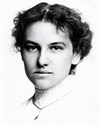Go out for beer and history at the theater at Kennedy School. Monday, March 30th at 7 p.m., at the McMenamins Kennedy School (5736 NE 33rd Ave, Portland)
In 1913, Caroline Gleason, later known as Sister Miriam Theresa, worked in Portland factories, surveyed working women across Oregon, and helped craft the nations first compulsory minimum wage law. Although that first version only applied to women and minors, Gleason’s work laid the foundation for the Fair Labor and Standards Act of 1938 and the minimum wage rates in place today.
Speaker (and NHN associate) Janice Dilg is an independent scholar from Portland, OR. She holds and MA in history from Portland State University and has contributed to numerous regional public history projects. As the Oral History Liaison, she coordinates the oral history project between the ORegon Historical Society and the US District Court of Oregon Historical Society. Since 2006, she has been an adjunct instructor at Portland State and is developing the Women’s City Builder’s website, which highlights women’s civic contributions to the city of Portland. She is currently working the upcoming centennial of women’s suffrage in Oregon in 2012.
Sponsored by the Oregon Historical Society, Holy Names Heritage Center, and McMenamins. Free; bring canned foods to donate to the Oregon Food Bank — all ages welcome. History Pub is the last Monday of every month.

